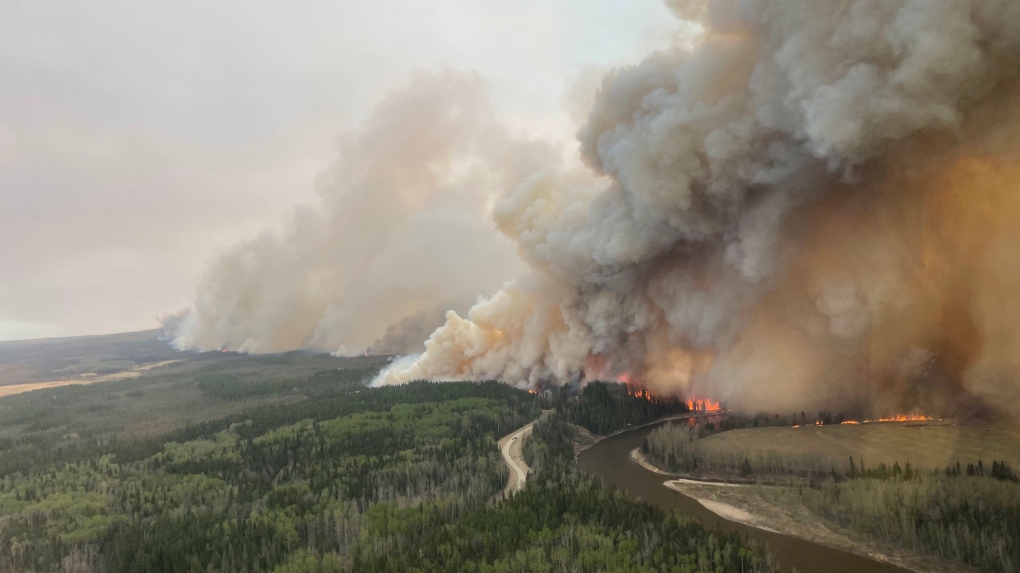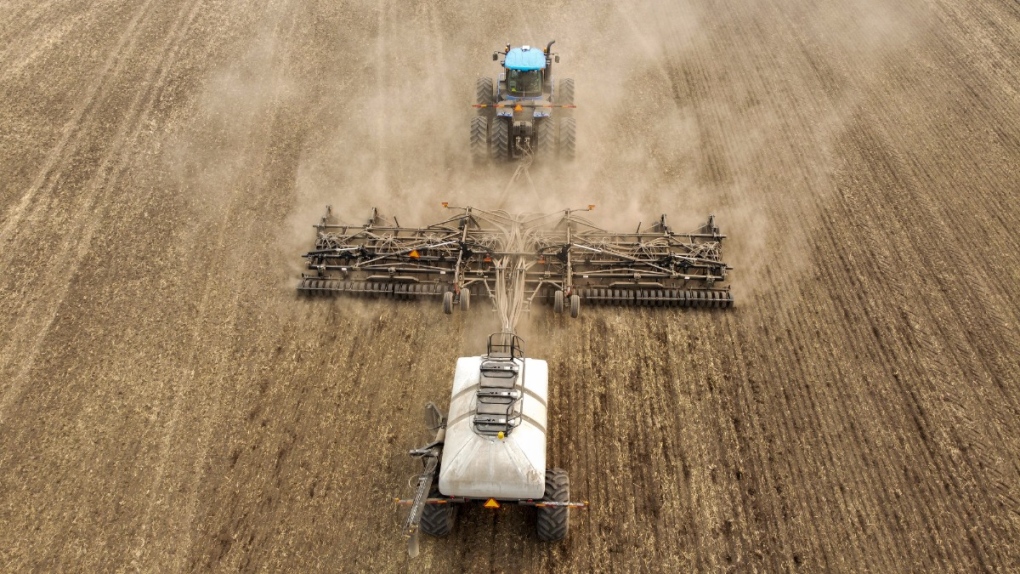Drought conditions spark government action, raise questions over wildfire response
With parts of Alberta gripped by severe drought, fire chiefs across the province are asking the government to share its strategy for fighting wildfires this year.
The Alberta Fire Chiefs Association (AFCA) published an open letter to the Alberta government Wednesday, expressing "significant concern" over the upcoming wildfire season.
AFCA president Randy Schroeder said fire chiefs have been meeting with government officials, but no plans for this year's wildfire response have been shared yet.
"They're acknowledging that if things don't change in 2024, it's going to be a problem for this province," said AFCA president Randy Schroeder. "And we don't have a plan in place that says, 'This is what the province is doing to prepare for response for the upcoming wildfire season.'"
In 2023, more than 2.5 million hectares of land was burned and more than 38,000 Albertans were displaced by wildfire. Schroeder said data on drought conditions suggest this year could be similar.
"If things don't change in the next 10 weeks in terms of moisture, [the wildfire season] is going to be equally unprecedented and equally severe," he added.
 A large wildfire burns this handout image provided by the Government of Alberta and posted on their social media page. (Source: Government of Alberta- Alberta Wildfire)
A large wildfire burns this handout image provided by the Government of Alberta and posted on their social media page. (Source: Government of Alberta- Alberta Wildfire)
In a statement Wednesday, Minister of Forestry and and Parks Todd Loewen said the government is confident in its ability to respond to wildfires.
Loewen said enhanced night operations, extra aircraft, more heavy equipment operators and additional dedicated wildfire crews are all part of the province's 2024 wildfire plan.
"Recruitment and training are already underway, with Alberta receiving a record number of applicants for wildland firefighter positions ahead of the 2024 wildfire season," Loewen said in a statement.
The AFCA said it wants to see a more comprehensive plan for wildland firefighting, including a working group dedicated to response readiness, increased public education efforts and a clear breakdown of fundings and resource agreements.
"[Last year] we saw local resources being deployed for extremely long periods of time. That has an impact on employers and families at the local level while we have volunteers out responding to need," he added.
Loewen said the province is also working on a wildfire mitigation strategy in line with one being finalized by the Canadian Council of Forest Ministers. No timeline was given on when the strategy would be finalized or implemented.
On Wednesday, 56 wildfires were burning in Alberta. Forty-five were under control and 11 were being held. All the fires being held were in the severely dry Peace River and High Level Forest Areas.
Wildfire season officially begins March 1.
The fire chiefs and the UCP encourage Albertans to learn more about FireSmart principals and how they can protect their homes and properties from wildfire.
CTV News Edmonton has also reached out to the minister of public safety but has not yet received a response.
'We'll have to pray'
The letter comes as parts of Alberta are experiencing some of the worst drought conditions on record, including the Dustbowl years of the 1930s.
Keith Degenhardt is a seed producer and rancher operating south of Wainwright.
His sloughs and dugouts dried up last spring and there hasn't been enough moisture since to replenish them.
"We are actually in worse shape this spring," Degenhardt said. "Our snow so far has been minimal … We did get a snowfall, but that snow is all but disappeared."
The lack of snowfall, record-low river levels and dwindling reservoirs have prompted the Alberta government to begin negotiations over water-sharing agreements in the Red Deer River, Bow River and Old Man River basins.
The Alberta government said the negotiations will be the largest water-sharing effort in Alberta since the drought of 2001-2002.
The agreements aim to protect water downstream by limiting upstream use during severe drought.
"We ask all those water users to come together to say, 'Look, if we don't need our full allocation, here's what we might be able to share with other users,'" said Rebecca Schulz, minister of environment and protected areas.
The province will ask large water licence holders to voluntarily use less water. Schulz said there are no plans to impose mandatory restrictions at this time.
 A stock photo shows a seeding rig planting a canola crop at a farm near Cremona, Alta. on May 16, 2023. (THE CANADIAN PRESS/Jeff McIntosh)Alberta is currently in Stage 4 of the province's water shortage management, with large-scale shortages impacting multiple water management areas.
A stock photo shows a seeding rig planting a canola crop at a farm near Cremona, Alta. on May 16, 2023. (THE CANADIAN PRESS/Jeff McIntosh)Alberta is currently in Stage 4 of the province's water shortage management, with large-scale shortages impacting multiple water management areas.
Stage 5 is classified as an emergency under the Water Act, where insufficient water poses a significant risk to human health and safety.
"We're not in an emergency situation; not a Stage 5 emergency situation just yet," Schulz said. "If we get to a point like that, that would be where the province would have the ability to maybe be more directive in situations where we need to be."
Degenhardt said this year's conditions are very similar to those during the early 2000s, when he personally saw a tenfold loss in crop production.
He plans to dig more wells for watering his cattle and will be planting seeds a little deeper, but he's still worried about what will happen if spring precipitation doesn't arrive.
"We'll have to pray that we get some moisture, enough to germinate the crop and get the crop going," Degenhardt said. "In the simplest terms, without water you can't grow a plant."
With files from the Canadian Press and CTV News Calgary's Bill Macfarlane
CTVNews.ca Top Stories

Ontario Premier Doug Ford threatens to cut off energy to U.S. in response to Trump's tariffs
Ontario Premier Doug Ford has threatened to cut off energy supply to the U.S. in response to the tariffs President-elect Donald Trump plans to impose on all Canadian imports.
Elon Musk calls Justin Trudeau 'insufferable tool' in new social media post
Billionaire Elon Musk is calling Prime Minister Justin Trudeau 'an insufferable tool' in a new social media post on Wednesday. 'Won't be in power for much longer,' Musk also wrote about the prime minister on 'X.'
Sask. hockey coach convicted of historic sex crime back on day parole after 'behavioural concerns'
A former WHL coach found guilty last year of sexually assaulting a teen boy is back on day parole.
The Body Shop Canada to be sold to Serruya Private Equity
The Body Shop Canada is due to be sold to a company led by the co-founder of frozen yogurt chain Yogen Früz.
Trudeau will have to 'kiss the ring' to achieve smoother bilateral relations with Trump: John Bolton
If Prime Minister Justin Trudeau wants to get on U.S. president-elect Donald Trump's good side for the sake of a smooth bilateral relationship, he'll likely have to be openly deferential, says former U.S. National Security Advisor, John Bolton.
Luxury real estate brokers charged in federal indictment with sex trafficking in NYC
Two luxury real estate brokers and their brother have been charged with luring, drugging and violently raping dozens of women over more than a decade.
Alberta family doctor suspended for unprofessional conduct
An Alberta family doctor and veterinarian has been suspended for unprofessional conduct.
Police locate labyrinth of tunnels connecting tents to generator in Hamilton encampment
Hamilton police say that they discovered a series of 'man-made holes and tunnels' during a patrol of a downtown encampment earlier this week.
Certain foods may disrupt your body's fight against cancer cells, study says
The food you eat may be affecting your body’s ability to fight cancer cells in the colon, according to a new study.


































